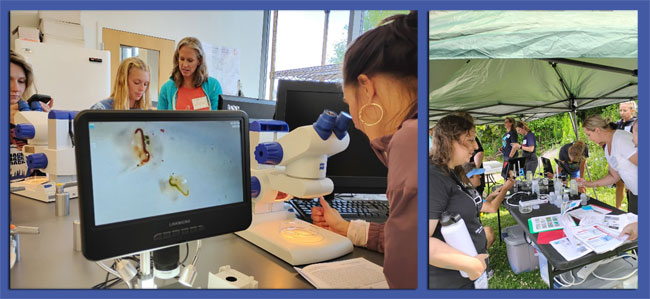
NYSG‘s 2024 Great Lakes Plankton Workshop. Credit: Nate Drag/NYSG
Contact:
Nate Drag, NYSG Great Lakes Literacy Specialist, E: nwd4@cornell.edu, P: (716) 270-2408
NYSG organized a two-day professional development workshop for teachers to meet researchers and learn about the microscopic world of Great Lakes plankton
Buffalo, NY, May 27, 2025 - Phytoplankton and zooplankton create the foundation of the Great Lakes freshwater food web, however, these microscopic organisms are often unseen and overlooked in K-12 education. Additionally, many of the existing plankton educational resources focus only on marine species. To develop materials on freshwater species, teachers and educators must have access to the knowledge, equipment, and skills required to create lesson plans and activities that align with New York State learning standards.
New York Sea Grant (NYSG) planned and facilitated a two-day workshop in July 2024 in Buffalo and Lewiston. Participants were trained and practiced collecting plankton from the shores of Niagara River using nets. They learned to identify different plankton species under a microscope and participated in a daphnia (small plankton crustacean) feeding experiment with researchers from Niagara University. They collected plankton samples from aboard the Miss Buffalo tour boat on Lake Erie, and worked collaboratively to discuss learning standard alignment and curriculum integration.
Each teacher received a plankton net, digital microscope, and other equipment to take back to their classrooms to use with students.
Twenty teachers and educators participated in NYSG’s 2024 Great Lakes Plankton Workshop. Prior to this workshop, 52% of participants stated they had no or minimal knowledge of phytoplankton and zooplankton. Following the workshop, 68% stated they now had above-average knowledge of these organisms. Similarly, prior to the workshop, only 29% of participants reported that they were confident in explaining phytoplankton and zooplankton content to their learners; after the workshop 94% of participants reported they were now confident to do so.
The Great Lakes Plankton Workshop was a successful professional development opportunity that engaged teachers in hands-on practice in the field and lab, leading to an increase in their knowledge about an important environmental topic and in their confidence in explaining it to students.
Project Partners/Funders:
• Center for Great Lakes Literacy
• Funding: Great Lakes Restoration Initiative
More Info: New York Sea Grant
Established in 1966, the National Oceanic and Atmospheric Administration (NOAA)’s National Sea Grant College Program promotes the informed stewardship of coastal resources in 34 joint federal/state university-based programs in every U.S. coastal state (marine and Great Lakes) and Puerto Rico. The Sea Grant model has also inspired similar projects in the Pacific region, Korea and Indonesia.
Since 1971, New York Sea Grant (NYSG) has represented a statewide network of integrated research, education and extension services promoting coastal community economic vitality, environmental sustainability and citizen awareness and understanding about the State’s marine and Great Lakes resources.
NYSG historically leverages on average a 3 to 6-fold return on each invested federal dollar, annually. We benefit from this, as these resources are invested in Sea Grant staff and their work in communities right here in New York.
Through NYSG’s efforts, the combined talents of university scientists and extension specialists help develop and transfer science-based information to many coastal user groups—businesses and industries, federal, state and local government decision-makers and agency managers, educators, the media and the interested public.
New York Sea Grant, one of the largest of the state Sea Grant programs, is a cooperative program of the State University of New York (SUNY) and Cornell University. The program maintains Great Lakes offices at Cornell University, SUNY Buffalo, Rochester Institute of Technology, SUNY Oswego, the Wayne County Cooperative Extension office in Newark, and in Watertown. In the State's marine waters, NYSG has offices at Stony Brook University and with Cornell Cooperative Extension of Nassau County on Long Island, in Queens, at Brooklyn College, with Cornell Cooperative Extension in NYC, in Bronx, with Cornell Cooperative Extension of Ulster County in Kingston, and with Cornell Cooperative Extension of Westchester County in Elmsford.
For updates on Sea Grant activities: www.nyseagrant.org, follow us on social media (Facebook, Twitter/X, Instagram, Bluesky, LinkedIn, and YouTube). NYSG offers a free e-list sign up via www.nyseagrant.org/nycoastlines for its flagship publication, NY Coastlines/Currents, which it publishes 2-3 times a year.